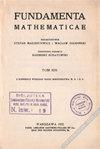Translation invariant linear spaces of polynomials
IF 0.5
3区 数学
Q3 MATHEMATICS
引用次数: 0
Abstract
A set of polynomials M is called a submodule of C[x1, . . . , xn] if M is a translation invariant linear subspace of C[x1, . . . , xn]. We present a description of the submodules of C[x, y] in terms of a special type of submodules. We say that the submodule M of C[x, y] is an Lmodule of order s if, whenever F (x, y) = ∑N n=0 fn(x) · y n ∈ M is such that f0 = . . . = fs−1 = 0, then F = 0. We show that the proper submodules of C[x, y] are the sums Md+M , where Md = {F ∈ C[x, y] : deg xF < d}, and M is an L-module. We give a construction of L-modules parametrized by sequences of complex numbers. A submodule M ⊂ C[x1, . . . , xn] is decomposable if it is the sum of finitely many proper submodules of M . Otherwise M is indecomposable. It is easy to see that every submodule of C[x1, . . . , xn] is the sum of finitely many indecomposable submodules. In C[x, y] every indecomposable submodule is either an L-module or equals Md for some d. In the other direction we show that Md is indecomposable for every d, and so is every L-module of order 1. Finally, we prove that there exists a submodule of C[x, y] (in fact, an L-module of order 1) which is not relatively closed in C[x, y]. This answers a problem posed by L. Székelyhidi in 2011.多项式的平移不变线性空间
如果M是C[x1,…,xn]的平移不变线性子空间,则一组多项式M被称为C[x1、…、xn]的子模。我们用一种特殊类型的子模来描述C[x,y]的子模。我们说C[x,y]的子模M是s阶的L模,如果当F(x,y)=∑N N=0 fn(x)·y N∈M时,f0=…=fs−1=0,则F=0。我们证明了C[x,y]的适当子模是Md+M的和,其中Md={F∈C[x、y]:deg xF
本文章由计算机程序翻译,如有差异,请以英文原文为准。
求助全文
约1分钟内获得全文
求助全文
来源期刊

Fundamenta Mathematicae
数学-数学
CiteScore
1.00
自引率
0.00%
发文量
44
审稿时长
6-12 weeks
期刊介绍:
FUNDAMENTA MATHEMATICAE concentrates on papers devoted to
Set Theory,
Mathematical Logic and Foundations of Mathematics,
Topology and its Interactions with Algebra,
Dynamical Systems.
联系我们:info@booksci.cn
Book学术提供免费学术资源搜索服务,方便国内外学者检索中英文文献。致力于提供最便捷和优质的服务体验。
Copyright © 2023 布克学术 All rights reserved.
京ICP备2023020795号-1
 京公网安备 11010802042870号
京公网安备 11010802042870号
京ICP备2023020795号-1

Book学术文献互助群
群 号:604180095

 求助内容:
求助内容: 应助结果提醒方式:
应助结果提醒方式:
